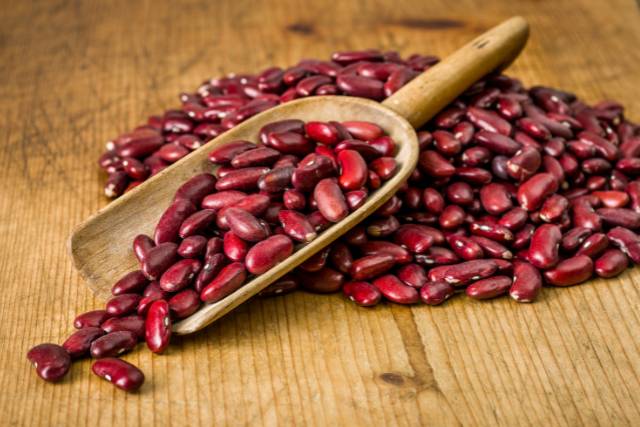Recent Posts
-

- Diabetes-Friendly Nutrition: Smart... 08.12.2024
-

- Nutrition for Chronic... 08.12.2024
-

- Anti-Inflammatory Diet: Food... 08.12.2024
-

- Low-Sodium and Heart-Healthy:... 08.12.2024
-

- Plant-Based Diets for... 08.12.2024
Nourishing and Nutrient-Rich: The Health Benefits of Kidney Beans

Enter the realm of kidney beans, where simple legumes are transformed into gourmet treasures with each simmer and stew. Kidney beans are a world of richness and velvetiness. These treasures, shaped like kidneys and covered in a velvety crimson coat, invite us to enter a world filled with healthy sustenance and delicious flavors. Beyond their outward look, they are a culinary chameleon, able to effortlessly adapt to various cuisines worldwide.
Imagine that the kidney bean is the brush that the artist uses to paint bright strokes on the canvas that is your plate. During this voyage through the world of food, we will uncover the story of kidney beans, a story of adaptability, a symphony of textures, and a celebration of the bean that has become a canvas for culinary creativity. We are about to go on a lovely journey that will delve into the world of flavor, nutrition, and the myriad ways kidney beans encourage us to appreciate the artistic potential of legumes.
Kidney beans, also known as Phaseolus vulgaris in the scientific community, are a kind of common bean that gets its name from the kidney-like form that they possess. Plants that are classified as legumes are members of the family Fabaceae. Because of their adaptability in the kitchen and the nutritional value they provide, these beans are the subject of widespread cultivation and consumption all over the globe.
Because kidney beans are formed like kidneys and range in size from medium to big, they are named kidney beans. Although various variants have various colors, such as pale red, white, and speckled, they have a unique reddish-brown color. However, they are also available in other colors.
Additionally, it is a flexible element used in the kitchen and is often utilized in a wide range of cuisines. Chilli, soups, stews, salads, and bean-based spreads are just some of the prominently included meals. They are an essential ingredient in many traditional cuisines throughout the globe.
Kidney beans are an excellent source of vitamins, minerals, fiber, and protein, making them a nutrient-dense diet. Because they are a good source of protein derived from plants, they are an essential component of diets focused on vegetarianism and veganism. In addition, they are a source of vital minerals such as magnesium, folate, potassium, and iron.
The high nutritional content of kidney beans makes them an excellent source of various health advantages. The consumption of kidney beans is related to several significant health advantages, including the following:
High in Protein Content
Kidney beans are an excellent source of plant-based protein, which is necessary for the repair of muscle tissue, the operation of the immune system, and the general growth and development of the body.
Packed with Fibre
Both soluble and insoluble forms of dietary fiber may be found in kidney beans (also known as kidney beans). In addition to facilitating digestion and assisting in maintaining regular bowel movements, fiber may also contribute to weight control by aiding in the sensation of fullness.
Good Heart Health
Kidney beans benefit the heart's health because of their high fiber, potassium, and folate content. Folate helps decrease homocysteine levels, a risk factor for heart disease. Fiber helps lower cholesterol levels, potassium helps improve blood pressure management, and folate helps lower homocysteine levels.
Keeps blood sugar levels stable
Because of the fiber and complex carbs that are included in kidney beans, they help to maintain stable blood sugar levels, which makes them an appropriate dietary choice for those who already have diabetes or who are at risk of getting the illness.
Iron Levels
Iron, an essential component of hemoglobin responsible for transporting oxygen throughout the bloodstream, may be found in kidney beans. The prevention of iron-deficient anemia may be aided by consuming iron-rich foods such as kidney beans.
Excellent source of vitamins and minerals
Kidney beans are a rich source of vitamins and minerals, including magnesium, phosphorus, zinc, and several B vitamins. These nutrients are necessary for the metabolism of energy, the maintenance of bone health, and the functioning of the immune system.
Managing Your Weight
Kidney beans include a beneficial mix of protein and fiber, which may assist with weight control by enhancing feelings of fullness and lowering the total number of calories consumed.
Having Antioxidant Capabilities
There are antioxidants found in kidney beans, which assist to neutralise free radicals in the body. This can potentially reduce the risk of developing chronic illnesses and improve general health.
Health of the Digestive System
By reducing constipation and encouraging regular bowel movements, the fiber included in kidney beans contributes to the maintenance of a digestion system that is in good condition.
The Source of Protein for Vegetarians and Vegans
Kidney beans are an essential source of plant-based protein, making them advantageous for people who adhere to vegetarian or vegan diets and are attempting to fulfill their protein needs.
It is essential to remember that kidney beans, even though they provide many advantages to one's health, are also a source of lectins. Additionally, they must be properly soaked and cooked to guarantee that they are safe for eating. The use of kidney beans as part of a diet that is well-balanced may provide a positive contribution to one's general well-being and support a variety of elements of health.
Disclaimer: The information provided in this article is for general information purposes only. All information in this article is sourced from other websites, and we do not represent any rights regarding the contents and information on the site. All rights belong to their original owner.





